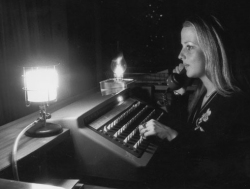What
was happening to production at MG Plant around the end of 1973?
Members
with MGBGTV8s made around the end of 1973 have been puzzled by the seemingly erratic"build"
dates for their cars but the country was in a state of turmoil at the time which
particularly affected car manufacture.
Posted: 140322
|  | With
the road tax exemption concession for cars built before 1st January 1974 due to
apply from 1st April 2014, many V8 members with chrome bumpered MGBGTV8s have
been checking to try and find the "build date" for their V8 to see if
it is eligible for the concession this year. For cars built close the 1973 year
end there have been some very frustrating findings - Dennis Wharf with Blaze 1189
found the "Date of Build" for his V8 are shown on his BMHIT Heritage
certificate as 4th - 11th January 1974, so he missed qualifying for the exemption
this year by less than two weeks. In another case Andrew Vine, with Glacier White
1147, found the build dates for his V8 were 18th December 1973 - 9th January 1974.
The Heritage certificates issued by BMHIT Gaydon for the MGBGTV8 model
give the "Date of Build" in that form and when we compare those | two
dates with the copy of the Factory records made by the late Geoff Allen in the
weeks before the MG Plant closed, we can see they seem to be the Date of Commission
and the Date through Paint Finishing. In Andrew's case this was particularly
frustrating because the dates straddled the year end and he was left wondering
why it took so long for his car to reach the stage where "painting was finished".
In fact the bodyshells came to the MG Plant from Cowley ready painted and then
went through assembly ending with a road test and a final quality check. Where
a problem was found on a car it went into Rectifications Department, which is
where Geoff Allen worked for some 27 years. There a gearbox change or another
job would be carried out and then the car was released for a final quality check.
So "Paint Finishing" was part of that final quality check. The next
stage noted in the production records is when the car was "Advised for Delivery"
to an MG dealer or distributor,
like Stewart & Arden or University Motors.
At the end of 1973 and into
1974 there were some exceptional conditions
affecting manufacturing industries in the UK like MG at Abingdon - inflation following
a major hike in oil prices, strikes resulting in power cuts and restrictions on
the commercial consumption of electricity. This situation caused serious disruption
to manufacturing plants, particularly companies like MG involved in production
line car assembly.
Power
cuts and the three day week at the turn of the year 1973-74
In the Britain
of the 1970s, power cuts and lengthy blackouts became a fact of life. The country's
electricity network had long been vulnerable to mechanical failure or industrial
action. In December 1970 hospitals were forced to function on batteries and candles
during a "work-to-rule" strike. But the oil price rise shock
in 1973 following the Arab-Israel war caused the situation to become even worse.
The Prime Minister at the time, Edward Heath, attempted to impose a prices and
incomes policy to cap rampant inflation, but the unions resisted. After a series
of miners' strikes, Heath declared a three-day week to reduce electricity
consumption, and thus conserve coal stocks. So a series of measures were announced
on 13th December 1973 by Heath, including the "Three-Day Work Order",
more commonly known as the Three-Day Week, which came into force at midnight on
31st December 1973. Commercial consumption of electricity would be limited to
three consecutive days each week
The effect was that from 1st January until
7th March 1974 commercial users of electricity were limited to three specified
consecutive days' consumption each week and prohibited from working longer hours
on those days. Services deemed essential, for example hospitals, supermarkets
and newspaper printers were exempt. Television companies were required to cease
broadcasting at 10.30 pm during the crisis to conserve electricity. The MG Plant,
like many manufacturing businesses, was subjected to these measures which disrupted
production of cars, particularly with the Christmas holiday break in 1973 and
the resumption of production in the new year (1974).
Prime Minister, Edward
Heath, called a snap election in February 1974 using the slogan "who governs
Britain?" but it resulted in the Conservative Party losing its majority.
Labour became the party with the most seats in the House of Commons, but without
an overall majority. In the resulting talks, Heath failed to secure sufficient
parliamentary support from the Liberal and Ulster Unionist MPs and Harold Wilson
returned to power for a short minority government third term. The normal working
week was restored on 8th March 1974, but other restrictions on the use of electricity
remained in force. Another general election was held in October 1974 cementing
the Labour administration, which gained a majority of three seats.
More
on the difficulties in 1973 and later & BBC
article & Guardian | | V8
Register - MG Car Club - the
leading group for MG V8 enthusiasts at www.v8register.net |
|



